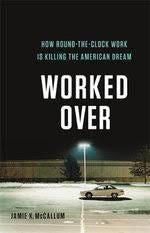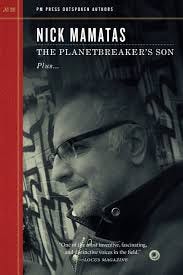In this issue:
Kylie Moore-Gilbert’s Sky News Interview
The Culture of Overwork
The Planetbreaker’s Son
Futures Virtual Special Issue Article on Richard A. Slaughter
15.4% Elite Capture
Kylie Moore-Gilbert’s Sky News Interview
This past week Australia’s Sky News screened a Melissa Doyle interview with Dr Kylie-Moore Gilbert, the Asia Institute-affiliated University of Melbourne academic who Iran held for over two years, for alleged spying. The Sky News interview revealed that Moore-Gilbert had travelled to Iran for a religious Islamic conference, and had then decided to spend a week and a half doing interview data collection for a project on the Gulf state of Bahrain. One of Moore-Gilbert’s Bahraini interviewees turned her in to Iranian authorities.
I took away several things from the Sky News interview and subsequent media coverage. Three narratives soon emerged. The first was that Iran’s Revolutionary Guards had tried to recruit Moore-Gilbert as a spy, which she refused to do. The second was Moore-Gilbert’s prison experiences and the psychological torture that she suffered. The third was the personal betrayal of Moore-Gilbert by her now estranged husband Ruslan Hodorov who had an alleged affair with her University of Melbourne family liaison and PhD Supervisor, Dr Kylie Baxter. This was a major ethical lapse.
Moore-Gilbert’s arrest and imprisonment highlights the danger of doing interviews and fieldwork in potentially hostile countries. The case has led to soul-searching in Australia’s foreign policy circles about hostage negotiations with Iran. It has also overshadowed Moore-Gilbert’s MECAF position at the University of Melbourne: a special role designed to help the incumbent to build a competitive research profile as an Early Career Academic. Moore-Gilbert’s strategy after her 2017 PhD was to build a track record on Bahrain, before her career interruption. Building this kind of expertise is important for area studies, international relations, and political science academics. I wish Moore-Gilbert a speedy recovery, return to the University of Melbourne, and look forward to her forthcoming memoir.
The Culture of Overwork
Universities suffer from a culture of overwork. For academic staff, the teaching, research, and service ratios of Teaching & Research roles are often either a myth or are detailed in a complicated workload model. For professional staff, there is always pressure from senior management to prove your ‘value add’ - a tactic often used as psychological leverage in negotiation bargaining - rather than one that actually leads to a deeper conversation about who generates surplus value, and who gets to appropriate it.
Overwork manifests as a colonisation of time, and often also as a lack of good boundaries. As the sociologist Jamie K. McCallum reveals in his recent book Worked Over: How Round-the-Clock Work is Killing the American Dream (New York: Basic Books, 2020), overwork has become endemic to many employers and industries in the United States, and has occurred due to the erosion of workers’ rights. Part of this dramatic shift is a neoliberal ideology of work-as-identity: something that I see every day on academics’ scrolling Twitter feeds. Understanding the broader forces that justify overwork - as well as the individual and collective strategies to deal with it - will be part of what I focus on this year.
The Planetbreaker’s Son
One of the personal highlights of editing and writing for the former Disinformation website was receiving dossier copy from Nick Mamatas. I sometimes had to consult Disinformation publisher Gary Baddeley to get legal clearance before publishing, and got some responsive reader email. Mamatas has had a growing, influential career trajectory as an editor, author, and as an anthology wrangler. Check out his Patreon and his new novella/interview collection The Planetbreaker’s Son, recently published by PM Press.
Futures Virtual Special Issue Article on Richard A. Slaughter
Futures journal editor Ted Fuller recently invited me to contribute to a Virtual Special Issue on Richard Slaughter - the influential futures studies and strategic foresight scholar, who I studied with in 2002-04. I’ve written a profile of several of Slaughter’s books that builds on an earlier piece and that also situates his research career trajectory in the neoliberal political economy of higher education. Here’s a paragraph on Slaughter’s book Futures Beyond Dystopia:
In retrospect Futures Beyond Dystopia was published at a transitional period – just after the 2000 dotcom crash and Al Qaeda’s terrorist attacks on 11th September 2001 but also before the 2003 Iraq War, the 2008-09 Global Financial Crisis or Great Recession, and before the 2020 COVID-19 pandemic-caused recession and the United States election that President Joseph R. Biden won. It was also published at a time that Swinburne University of Technology’s then Vice-Chancellor Ian Young sought to shut down Swinburne’s Institutes including the Australian Foresight Institute in order for neoliberal cost-savings. These mini-dystopias unleashed a much darker timeline for Earth, before Slaughter’s more hopeful vision could take hold for a broader audience. We are today still living with the consequences.
I’ll likely upload an Author Accepted Manuscript version to my Academia.edu profile when the article is published.
15.4% Elite Capture
Former Australian Prime Minister Malcolm Turnbull has spoken out about the Coalition’s debate on raising Australia’s superannuation:
“Politicians and public servants have a compulsory 15.4% super contribution that was determined, presumably a very long time ago, because it was felt that that was an appropriate level to provide sufficient savings for retirement,” Turnbull said.
“So isn’t it somewhat at odds, somewhat patronising, for people who benefit from 15.4% super, to say that working people should be, should you know settle for nine and a half?”
Former Prime Minister Turnbull’s insight is that this 15.4% will lead to differential, compounding returns over time for elected politicians versus their electorate. It’s elite capture, pure and simple: one rule for them, another one for us, a legislated edge. But asset allocation is also critical, as Yale University’s Chief Investment Officer David F. Swensen has proven. The financial year to date returns on Unisuper’s Global Environmental Opportunities fund has been 48.77%. Past performance is not a guarantee of future returns.
Previous Issues and Sites
Alex Burns: my professional academic site.
Vega Theory: a regular blog about my research program.
My Academia.edu profile and papers archive.
My Twitter account with daily updates.




